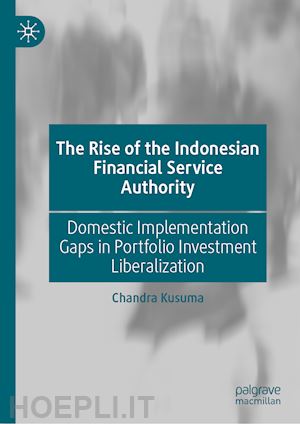

Questo prodotto usufruisce delle SPEDIZIONI GRATIS
selezionando l'opzione Corriere Veloce in fase di ordine.
Pagabile anche con Carta della cultura giovani e del merito, 18App Bonus Cultura e Carta del Docente
This book focuses on the Indonesian Financial Service Authority (FSA), which is a newly established authority within Indonesian financial services institutions that has emerged as the ultimate decision-maker for portfolio investment liberalization. In doing so, the book elaborates on how the emergence of the Indonesian FSA has resulted in implementation gaps in Indonesia, in the area of portfolio investment liberalization.
The book reveals that the endowment of an ‘independent and free’ status, as well as the FSA’s power over the Indonesian financial sector, has allowed agents in the FSA to provide different positions or responses to the already agreed ASEAN financial liberalization initiatives. Contrary to the expectations of most writers that the independent status of an institution would advance financial liberalization, this book shows that the ‘independent and free’ status of the Indonesian FSA has actually stymied financial liberalization.To achieve this, thebook employs a modified account of the historical institutionalism approach, or ‘the agents-in-context’ approach, examining how and why the Indonesian FSA has emerged as an independent authority. The insights drawn from applying a modified historical institutionalism approach to the case study of Indonesian portfolio investment liberalization critiques and complements existing works in the regionalism literature in general, and ASEAN financial integration particularly.
Chapter 1: Introduction.- Chapter 2: Modified Historical Institutionalism.- Chapter 3: The Emergence of the Indonesian FSA.- Chapter 4: The Indonesian FSA and Stymied Portfolio Investments Liberalizaton.- Chapter 5: Emerging Challenges to Domestic Implementation of Portfolio Investments Liberalization.- Chapter 6: Conclusion.
Chandra Kusuma is a senior official for the government at the Fiscal Policy Agency of the Ministry of Finance of the Republic of Indonesia (MOF), serving the Ministry since 2004. He is also a Sessional Lecturer at the Indonesian State College of Accountancy (PKN-STAN) teaching courses on Banks and Financial Institutions, as well as Macroeconomics. He holds a Ph.D. in International Political Economy from the University of Queensland, Australia.











Il sito utilizza cookie ed altri strumenti di tracciamento che raccolgono informazioni dal dispositivo dell’utente. Oltre ai cookie tecnici ed analitici aggregati, strettamente necessari per il funzionamento di questo sito web, previo consenso dell’utente possono essere installati cookie di profilazione e marketing e cookie dei social media. Cliccando su “Accetto tutti i cookie” saranno attivate tutte le categorie di cookie. Per accettare solo deterninate categorie di cookie, cliccare invece su “Impostazioni cookie”. Chiudendo il banner o continuando a navigare saranno installati solo cookie tecnici. Per maggiori dettagli, consultare la Cookie Policy.